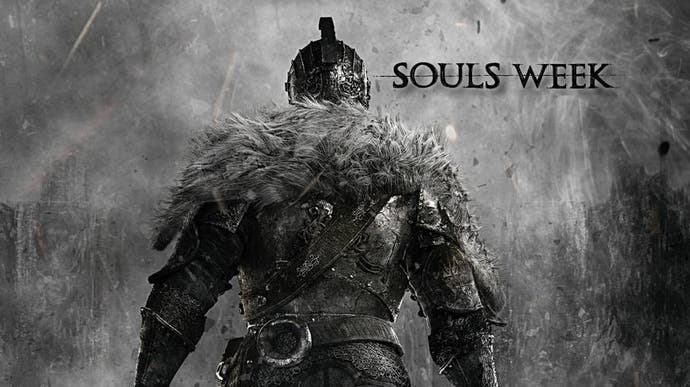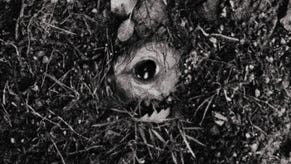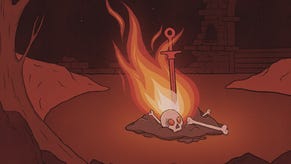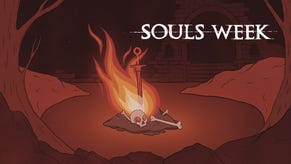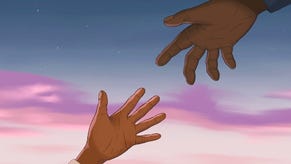Souls Week: Dark Souls 2 is the best Dark Souls game that isn't Dark Souls or Dark Souls 3
"It's almost whimsical to begin withˇ"
Welcome back to Souls Week! Today, Caelyn's going to make the case for Dark Souls 2, in a piece that contains spoilers.
It took me a while to get into Dark Souls. That seems like a weird thing to be writing now, akin to, "I wasn't sure about ice cream at first" or, "I didn't like the look of puppies." But I bounced off it a couple of times before being properly ensnared. As a result, by the time I was looking for more Soulsian adventures, Dark Souls 2 Original had been and gone and Scholar of the First Sin was on shelves. According to The Internet, Dark Souls 2 is rubbish. You may be surprised to learn that The Internet is, just for once, spouting hyperbolic nonsense. Dark Souls 2 is actually really good and, let me just brace for impact here, better than Dark Souls 1 in a lot of ways.
I've got to hold my hands up and admit that I was suckered in for a while. You can wring a lot of quality gaming time out of the original Dark Souls. It hides so many secrets and there are so many different ways to build a character, so many different weapons and spells to experiment with. I still go back and play it now and whether it's finding new things to love or just spending time with a good old sword-and-board combo, it's always worthwhile. Back then, after playing it through with a couple of different builds and dabbling in a bit of NG+, "more of the same, but less good" didn't seem appealing. I mean, why not just play the original some more. I believe it was my brother who prodded me into giving Dark Souls 2 a go and I'm very glad that I did.
In many ways, Dark Souls 2 has exactly what you'd expect from a sequel. It takes the systems from the original and builds on them in new and interesting ways. There are callbacks to the original, though in typical Dark Souls fashion these are mostly small hints that gradually bring the realisation that they are set in the same place, just separated by a vast span of years.
Dark Souls 2 has the distinction of being the only game in the series, and indeed From Software's entire Soulsborne stable, to not be directed by Hidetaka Miyazaki, with Tomohiro Shibuya and Yui Tanimura taking on those duties instead. This distinction is immediately noticeable and permeates the entire game, making it something of a middle-of-trilogy oddity. At first, it seems like the game is lighter and more rooted in traditional mediaeval fantasy than its predecessor, and indeed its successor. The airy coastal town of Majula that serves as the game's hub is a far cry from the dark, oppressive Firelink Shrines of the other games. It's almost whimsical to begin with, but it soon turns a corner into a dreamlike surreality that is just as haunting and isolating as the more overt gothic tones of the rest of the series. Maybe ironically, this shift in tone brings Dark Souls 2 even closer to the late Kentaro Miura's Berserk, the acclaimed manga that is a huge influence on From Software's fantasy worlds.
Of course the reason that Miyazaki wasn't available to work on Dark Souls 2 was that he was busy with PS4 exclusive Bloodborne, which differentiated itself from the Souls titles with much faster, more aggressive combat. When Miyazaki returned to direct Dark Souls 3, he brought that pacier pugilism with him, resulting in a hybrid combat system that is a distinct departure from the earlier games. This reinvention renders Dark Souls 2 a sort of evolutionary dead end, with the new elements introduced to combat largely being discarded for the sequel.
As something of a mediaeval weapons nerd who adores the deliberate, thoughtful melees of the series, it's these refinements that kept me coming back to Dark Souls 2 again and again, shoving my played time on Steam way above that of the original. The big, flashy addition is dual-wielding, which is an entirely new combat option. While there is nothing stopping you from using a weapon in each hand in the original Dark Souls, it's not really supported as a combat style. It has its advocates, particularly in PvP, where a combination of weapon types can help keep an opponent on their back foot, but there are no new moves available. In Dark Souls 2 it becomes possible to enter a Power Stance which gives access to a whole new combined moveset. While not every pair of weapons can be utilised in this way, most can and different weapon combinations result in different moves. Sadly, this feature was removed entirely in Dark Souls 3, replaced with set paired weapons that functioned in a similar way.
More subtle changes include adding extra moves to halberds and similar polearms, allowing the pointy bit to be used like a spear with a shield raised. It's a small thing that will go completely unnoticed by many players, but is catnip for massive dorks like me. There are twin-bladed swords for all the Darth Maul wannabes out there, and weapons that can also be used as spell-casting implements, trading power for versatility. Thankfully, this last set of items was retained for Dark Souls 3. Hooray for options!
The result is a combat system that, for my estus, is much more compelling than the original game's. These things don't exist in isolation and Dark Souls the First still wins out as the better game overall, a more cohesive package. If they were tabletop RPGs, I'd argue that Dark Souls 2 is a better ruleset, but Dark Souls has a much better Gamesmaster. Thankfully, despite what The Internet might think, something not being the bestest best everer doesn't mean that it can't be really, really good. Dark Souls 2 is really, really good and absolutely worth your time, even if it doesn't quite hit the dizzying heights that From Software is capable of.
